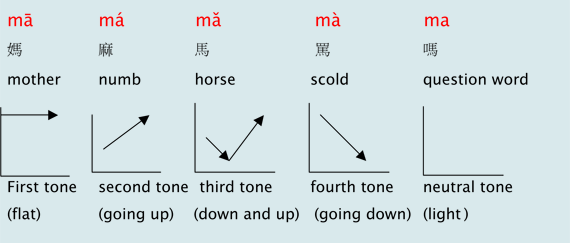Chinese Pronounciation
Tones

In Mandarin Chinese language, there are 4 major tones and 1 neutral tone of pronunciation used to differentiate meanings:
- First Tone: First tone is represented by a straight horizontal line above a letter in pinyin. Its tone is high and level. When reading a Chinese word with this tone, one's voice must be even.
- Second Tone: Second tone is represented with a diagonal line going up above a letter in pinyin (increasing in a graph). Its tone is high in pitch. When speaking, one's voice must rise in pitch using this tone.
- Third Tone: Third tone is represented with curved "dipping" line above a letter in pinyin, first the line goes down and then it rises up. Same goes with the tone, it has a fall-rise tone when we speak with this tone.
- Fourth Tone: Fourth tone is represented with dropping diagonal line above a letter in pinyin. Its tone is high at first, but drops down sharply as the word ends.
- Fifth Tone: Fifth tone is a neural tone with no line indication above letters in pinyin.


Comments
Post a Comment